Giardia is a microscopic parasite that poses a significant health threat to both dogs and cats. This protozoan invader resides in the intestines and can cause a gastrointestinal infection known as giardiasis. Commonly spread through contaminated water, food, or direct contact with infected feces, Giardia can lead to symptoms such as diarrhea, vomiting, and weight loss in pets. Early detection and treatment are crucial in preventing severe health complications and ensuring the well-being of your furry companions. Understanding Giardia and its impact on pet health is essential for every veterinarian. Read on to discover the signs, symptoms, and how the VetFor Giardia Rapid Antigen Test Kit can help protect your pets.
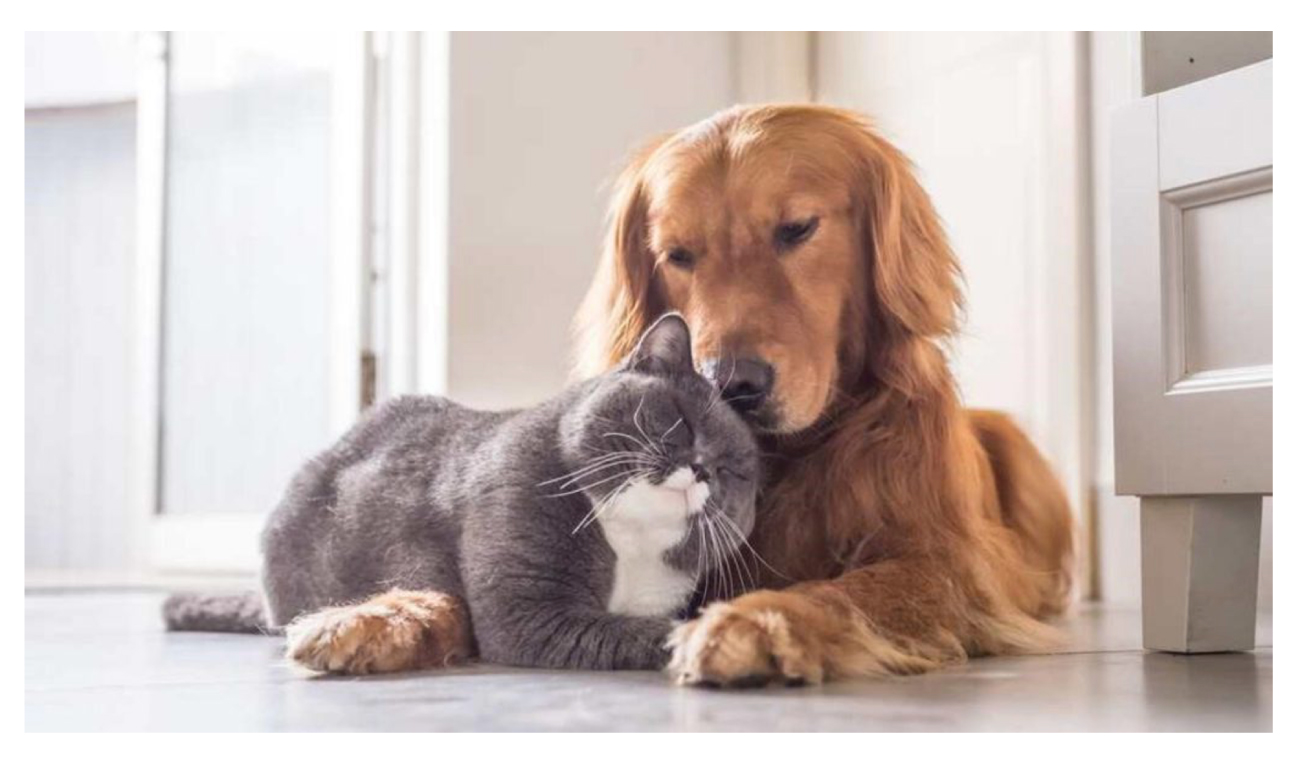
What is Giardia?
Giardia is a single-celled protozoan parasite that infects the intestines of mammals, including dogs and cats. Scientifically known as Giardia duodenalis (or Giardia lamblia), this parasite exists in two forms: the active trophozoite and the dormant cyst. The trophozoite is the active stage that resides in the intestines, causing the symptoms of giardiasis. When outside the host, Giardia forms into cysts, which are highly resistant and can survive in various environmental conditions for extended periods. These cysts are the infectious form, capable of spreading the parasite to new hosts through contaminated water, food, or surfaces.
The life cycle of Giardia begins when a host ingests cysts from the environment. Once inside the host’s intestines, the cysts transform into trophozoites, which attach to the intestinal wall and begin to multiply. This attachment disrupts the normal absorption of nutrients and water, leading to the characteristic gastrointestinal symptoms of giardiasis. The trophozoites eventually encyst and are excreted in the host’s feces, ready to infect new hosts. This fecal-oral transmission route makes Giardia highly contagious, particularly in environments with poor sanitation or crowded living conditions, such as kennels and shelters.
Giardia infection, or giardiasis, can range from asymptomatic to severe, depending on the number of parasites ingested and the host’s immune response. Infected pets may exhibit a variety of symptoms, including chronic diarrhea, greasy stools, weight loss, and general lethargy. Due to its resilience and the ease with which it spreads, Giardia poses a significant health risk not only to pets but also to humans, highlighting the importance of early detection and effective treatment. Understanding the biology and life cycle of Giardia is essential for preventing and managing infections, making tools like the VetFor Giardia Rapid Antigen Test Kit invaluable for veterinarians alike.
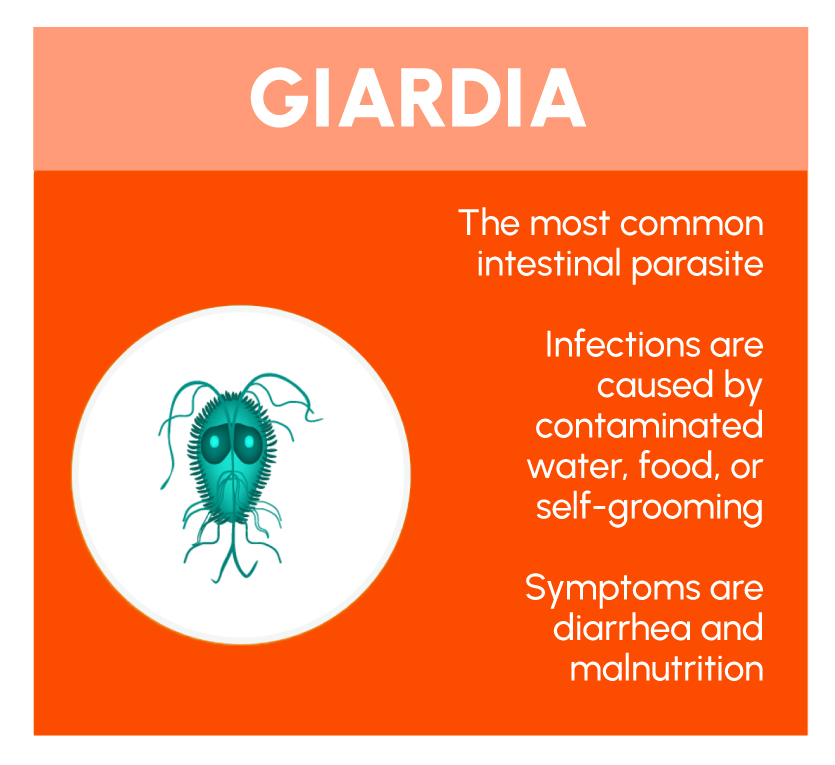
Giardia and Your Pet: Transmission
Giardia is a single-celled parasite that has a distinct pear or teardrop shape. It lives in the intestines of infected animals and is shed in their feces. The parasite is transmitted when an animal ingests contaminated food, water, or soil. This can happen when a pet drinks from a contaminated water source, eats contaminated food or comes into contact with feces from an infected animal. The parasite can also be transmitted through direct contact with an infected animal.
The parasite is spread through the feces of infected animals and can survive in the environment for several months. Giardia infections are more common with poor sanitation, and sadly, this can be pet stores, animal shelters, and breeding facilities.
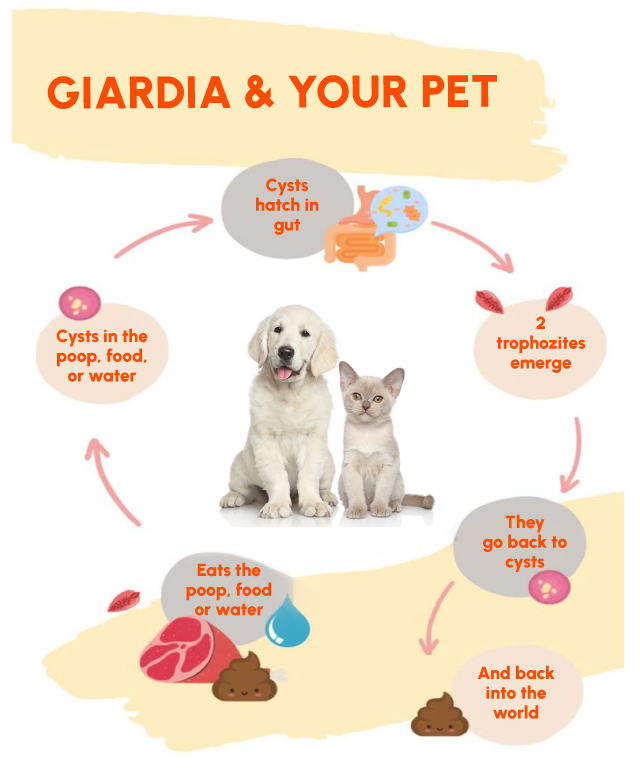
Symptoms of Giardia in Pets
Giardia infection, known as giardiasis, can present a wide range of symptoms in pets, varying from mild to severe. One of the most common and noticeable symptoms is diarrhea, which can be intermittent or chronic. The diarrhea is often characterized by a foul odor, and a greasy texture, and may sometimes contain mucus. Unlike typical diarrhea, which might resolve on its own, giardiasis-induced diarrhea tends to persist and can lead to significant dehydration and nutrient loss if left untreated.
In addition to diarrhea, vomiting is another symptom that might be observed in pets suffering from Giardia. Vomiting can further exacerbate dehydration and make it challenging for pets to maintain proper hydration levels. Weight loss is also a prevalent symptom, particularly in cases where the infection becomes chronic. The inability to properly absorb nutrients from food due to the intestinal damage caused by the trophozoites leads to weight loss and poor body condition. Affected pets might appear thin, with ribs and spine becoming more prominent as the condition progresses.
Lethargy and general malaise are other key indicators of giardiasis in pets. Infected animals often display reduced energy levels, reluctance to play or exercise, and may seem more tired than usual. This lack of energy can be attributed to both the physical discomfort caused by the gastrointestinal upset and the overall impact of the infection on the pet’s health. In severe cases, giardiasis can lead to failure to thrive, especially in young animals such as puppies and kittens. They might experience stunted growth and developmental delays due to the ongoing nutrient deficiency. Recognizing these symptoms early is crucial for timely diagnosis and treatment, which can help prevent further health complications and ensure the well-being of your pets.
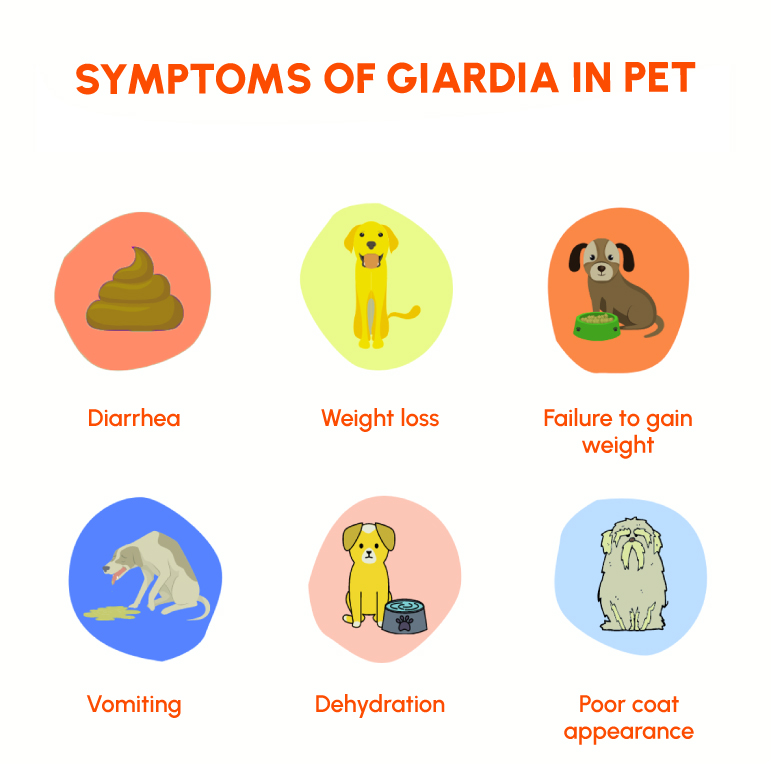
The Impact of Giardia on Canine and Feline Health
Giardia infection can have a profound impact on the health and well-being of both dogs and cats. The primary consequence of giardiasis is gastrointestinal distress, but the ripple effects of the infection can extend far beyond the digestive system. The constant presence of Giardia trophozoites in the intestines can lead to chronic inflammation and damage to the intestinal lining, which impairs the absorption of nutrients and fluids. This malabsorption results in a range of nutritional deficiencies that can weaken the overall health of the affected animal.
One of the most immediate and noticeable impacts of Giardia infection is severe dehydration. The persistent diarrhea caused by the parasite leads to significant fluid loss, which, if not promptly addressed, can result in acute dehydration. This is especially dangerous for young, old, or already weakened pets, as dehydration can quickly escalate to a life-threatening condition. Alongside dehydration, the inability to properly absorb nutrients due to intestinal damage often results in weight loss and muscle wasting. Affected animals may exhibit a marked decline in their physical condition, with ribs and spine becoming more prominent.
The chronic nature of giardiasis can also have long-term effects on a pet’s immune system. Constant battling of the infection can overburden the immune response, making the animal more susceptible to other infections and diseases. Additionally, the ongoing inflammatory response in the intestines can lead to secondary complications such as irritable bowel syndrome (IBS) or other chronic gastrointestinal disorders. In young animals, such as puppies and kittens, Giardia infection can severely impede growth and development. The energy and nutrients that should be fueling their growth are instead diverted to combating the parasite, resulting in stunted growth, developmental delays, and an overall failure to thrive.
Moreover, the impact of Giardia extends beyond physical health. Chronic illness can affect a pet’s behavior and quality of life. Infected animals often exhibit lethargy, decreased activity levels, and a lack of interest in play or exercise. This reduction in activity not only affects their physical health but also their mental well-being. The discomfort and constant need to relieve themselves due to diarrhea can lead to stress and anxiety, further diminishing their quality of life.
Early detection and treatment of Giardia are crucial in mitigating these impacts and restoring the health of affected pets. By using tools like the VetFor Giardia Rapid Antigen Test Kit veterinarians can quickly diagnose the infection and begin appropriate treatment, helping to prevent the severe consequences of prolonged giardiasis and ensuring a better quality of life for pets.
VetFor Giardia Rapid Antigen Test Kit
Early detection is pivotal in managing Giardia infections effectively and curbing their spread among pets and humans. The VetFor Giardia Rapid Antigen Test Kit stands as a frontline solution, offering a swift and accurate means of diagnosing Giardia infection in both dogs and cats. This innovative kit, designed with user convenience in mind, provides reliable results, empowering veterinarians to promptly identify and address Giardia-related concerns.
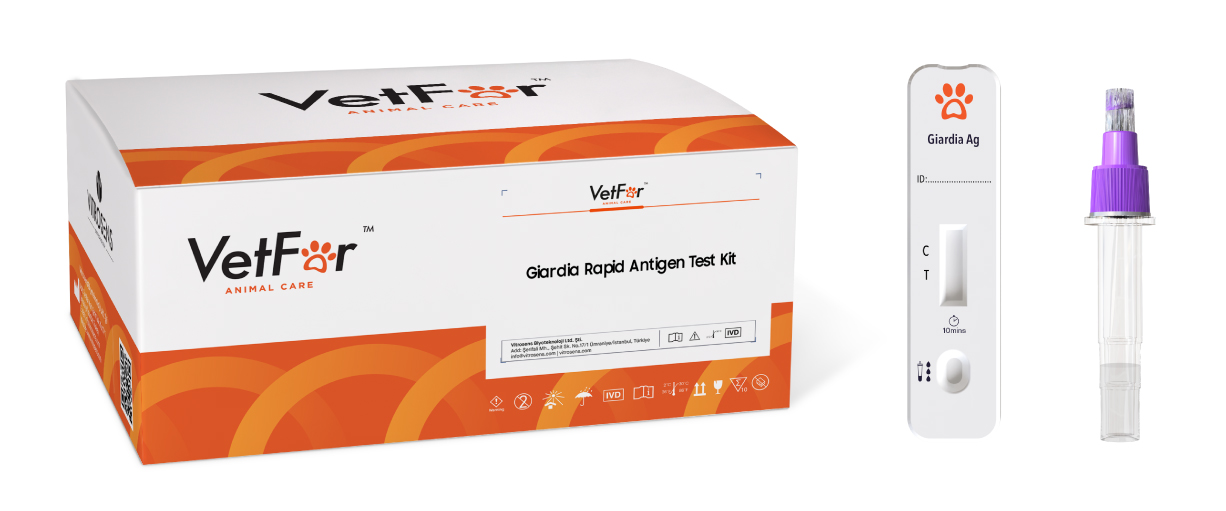
How to Use the VetFor Giardia Rapid Antigen Test Kit
Using the VetFor Giardia Rapid Antigen Test Kit is a straightforward process designed for ease of use by veterinary professionals. This section will guide you through each step of the procedure to ensure accurate and reliable results for detecting Giardia antigens in canine and feline fecal samples.
Materials Provided in the Kit
The VetFor Giardia Rapid Antigen Test Kit includes all the necessary components to perform the test:
- Test cassettes
- Solution tubes
- Sample collection swabs
- Instruction manual
Additional materials you will need (not included in the kit):
- A timer
Sample Collection
- Prepare the Swab:
- Open the swab package by pulling apart at the marked point and carefully remove the swab.
- Avoid touching the soft, textile end of the swab with your hands or any other objects to prevent contamination.
- Collect the Sample:
- Using the provided swab, collect a fecal sample from the dog or cat. You can either collect the sample from the feces or gently insert the swab into the rectum to cover it with a thin layer of fecal matter.
- Ensure the sample amount is sufficient but not excessive, as this can affect the test results.
Sample Processing
- Prepare the Solution Tube:
- Open the large cap of the solution tube, being careful not to spill the liquid inside.
- Mix the Sample:
- Insert the swab with the collected sample into the solution tube.
- Rotate the swab inside the tube at least 10 times to thoroughly mix the sample with the solution. Press the swab against the sides of the tube to release the sample into the liquid.
- Ensure that the sample is fully dissolved in the solution. This process should take at least 20 seconds.
- Remove the Swab:
- Remove the swab from the tube, ensuring to squeeze out as much liquid as possible from the swab before discarding it.
- Securely close the tube with the cap.
- Settle the Sample:
- Let the tube stand upright for 1 minute to allow large fecal particles to settle at the bottom.
Performing the Test
- Prepare the Test Cassette:
- Open the foil pouch containing the test cassette and place the cassette on a clean, flat surface.
- Perform the test at room temperature, in an environment with no more than 70% humidity, and use the cassette within 15 minutes of opening.
- Apply the Sample:
- Open the small cap of the solution tube carefully.
- Add 3 drops of the processed sample solution into the sample well (marked as “S”) on the test cassette.
- Start the timer.
- Read the Results:
- Wait for 10 minutes and then read the test results.
- Positive Result: Both the test line (T) and the control line (C) appear, indicating the presence of Giardia antigens.
- Negative Result: Only the control line (C) appears, indicating no Giardia antigens detected.
- Invalid Result: If the control line (C) does not appear, or only the test line (T) appears, the test is invalid and should be repeated with a new test cassette.
Storage and Stability
- Store the VetFor Giardia Rapid Antigen Test Kit between 2°C and 30°C. Do not freeze.
- Keep the test kit in its original, sealed pouch until ready to use.
- Avoid direct sunlight and ensure a humidity level of 40-60%.
- Do not use the kit beyond its expiration date.
Proper use of the VetFor Giardia Rapid Antigen Test Kit ensures accurate and rapid detection of Giardia infections, helping to safeguard the health of your canine and feline companions. For further information or inquiries, please contact us at info@webdemo102.tech.
Stay Informed, Stay Protected: Stay tuned for future installments where we delve deeper into pet health and well-being, providing valuable insights and practical tips to ensure your pets lead fulfilling and healthy lives.
